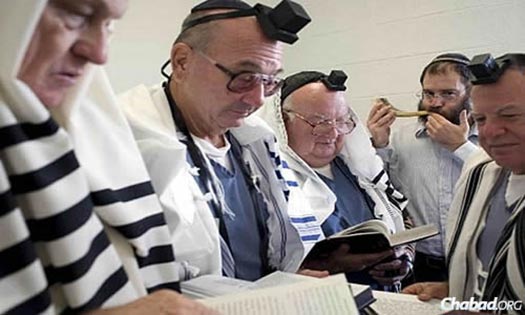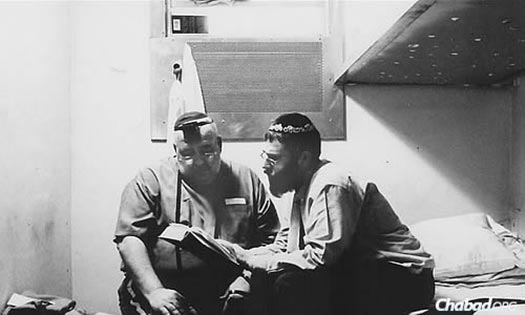
Volunteers to Spend Their High Holidays in Prison
Anna Koozmin, a 20-year-old sophomore at the University of Maryland, loves the popular Netflix series about a woman’s prison for the way it delves into the back stories and lives of inmates at a federal women’s prison. A behavioral- and community-health major who volunteers at a juvenile prison in Washington, D.C., she finds the show entertaining, but is under no illusions that it fully or accurately portrays life at the Federal Correctional Institution in Danbury, Conn.
Now, Koozmin is about to find out for herself what the place is like—at least for a day.
She will be spending Yom Kippur, which begins on the evening of Oct. 3, at the prison that inspired the best-selling memoir and popular television series. Koozmin is organizing a group of six women—all college students—who plan drive to Connecticut, sleep in an RV, and help lead Kol Nidre and Yom Kippur day services for Jewish inmates. She says it’s an opportunity to combine her interest in working with vulnerable populations with a desire to have a more meaningful holiday experience.
Inmates, she believes, should not be forgotten. They deserve a holiday experience, as well a chance to connect with the Jewish tradition and other Jews, just like anyone else. Koozmin notes that the Yom Kippur themes of repentance and changing for the better may resonate in a deeply personal way for inmates.
“A lot of the themes of Yom Kippur the inmates can relate to,” says Koozmin. “They have all had their judgment day.”
Loving Every Jew
A total of 38 University of Maryland students have signed up to volunteer at seven separate correctional institutions. Their commitment is part of a much larger effort being spearheaded by the Aleph Institute, based in Surfside, Fla. The Chabad-Lubavitch-affiliated nonprofit organization, which is more than 30 years old, serves both the military and the incarcerated, in addition to their families. According to its website, it also helps create “solutions to significant issues relating to [the U.S.] criminal-justice system.”
Aleph is organizing full High Holiday services on Rosh Hashanah and Yom Kippur at 40 state and federal prisons nationwide. It is also sending honey and prayer books, in addition to meeting with prisoners individually at some 400 prisons, according to Rabbi Menachem Katz, director of prison and military outreach.
Katz has been visiting prisons on the High Holidays for more than 20 years now. These days, he is also leading the national effort of organizing volunteers—including Chabad emissaries, rabbinical students and lay people like Koozmin—and matching them with existing needs. Aleph is spending at least $100,000 on airline tickets, getting folks where they need to go.
All volunteers receive at least some training from Aleph beforehand. One question they are told never to ask: “So, what are you in for?”
The guiding principle driving Aleph’s prison outreach is the idea of loving each and every Jew, regardless of his or her past deeds. The community has a responsibility, insists Katz, to let prisoners know that they are not alone, and that someone cares about them.
Inmates, he continues, may be isolated from their families, can face anti-Semitism behind bars or feel in danger of losing their sense of self.
“It is actually very fulfilling,” Katz says of spending the High Holidays in prison. “You’ve got all the ingredients to make it a very meaningful or selfless experience.”
The key to running services on the holidays is just like the key to all prison work, he adds: Don’t be judgmental.
Still, things haven’t always run smoothly. Two years ago, before holding Rosh Hashanah services at a New Jersey prison, he was asked to move his car. He explained he was not allowed to drive on a holy day, but it did little good. His car was towed, and with it, all of the tallises he had planned to bring into the prison.
Still, he carried on.
‘Changed My Whole Outlook’
Achiezer Langsam, a 20-year-old rabbinical student at the Rabbinical College of America in Moorestown, N.J., was looking forward to spending the holidays with his family in the Crown Heights neighborhood of Brooklyn, N.Y. But when he a fellow student asked him if he’d like to volunteer during the High Holidays, his instincts wouldn’t let him refuse.
Langsam will be co-leading Rosh Hashanah and Yom Kippur services at a minimum security prison in Miami. He’ll be staying at a hotel that’s about a 40-minute walk from the facility. In between the holidays, he has also arranged to help a local Chabad emissary with preparations.
“I am a little bit nervous,” he acknowledges. “But nervousness is a good thing. It pushes you to give it all you got.”
Yosef Junik, a rabbinical student from London studying at Chabad-Lubavitch World Headquarters in Crown Heights has volunteered in prisons for four years running. This year, he has signed on to conduct services at the Fort Dix U.S. Army base in New Jersey.
The experience, he notes, is good training for what he hopes to do next—become a shaliach, a Chabad-Lubavitch emissary.
“I’m not looking at it as a scary situation. Inmates want to be part of and have a Jewish community,” he says. “For the most part, they are very happy. They don’t have a lot of visitors.”
“They are Jewish people. They are still people at the end of the day,” he continues. “Doing this has changed my whole outlook on people in general.”
Koozmin, the University of Maryland student, says she’s still waiting to hear how much time her group will have with the women prisoners on Yom Kippur. Aleph is pushing for five hours on the day of Yom Kippur, but the group might not get that long.
Whatever happens, she gets a sense this may be the most powerful Yom Kippur of her young life.
“I think it will be a really meaningful experience for both sides,” she says. “Sometimes, we forget how important this holiday really is. And this experience will shed new light and meaning behind it.”


















they have a pen pal service too
I correspond with an inmate in Texas, She’s trying to reconnect to Hashem and his mitzvos, to the extent she can while in prison. It’s a real struggle. He appreciates every bit of Torah info or mitzva observance I give over to her. If you have a few extra minutes once in a while, Sign up at Aleph, and they’ll match you with an inmate.